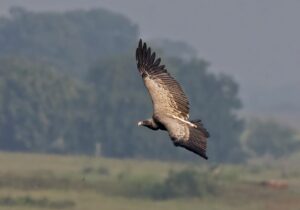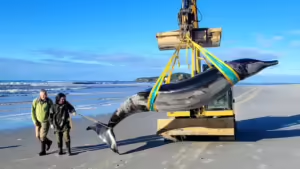A polar bear completed its own ultra-marathon this week, wandering more than 1,000km inland from its usual Arctic Ocean habitat.
Villagers in Batagai, Russia first spotted the wayward polar bear six weeks ago. It kept moving south, reaching Topolinoye and later Khandyga. When it appeared in the coal mining village of Dzhebariki-Khaya, local hunters spent eight hours keeping it at bay from residents. Wildlife specialists eventually caught it in a special cage, using seal fat as bait.

A polar bear evaded capture for more than six weeks as it wandered through villages. Photo: The Siberian Times
The group then transferred the bear temporarily to the Orto Doidu, a government wildlife facility near the regional capital of Yakutsk.
“We prepared a transportation box and loaded it into a Polar Airlines helicopter,” said a spokesperson with the Ministry of Ecology. “In an hour and a half, the bear was in Yakutsk.”
Orto Doidu lies 50km from the city centre. Established in 2001 on the banks of the Lena River, it houses camels, yaks, a brown bear, a monkey, and a number of polar bears.
Sometimes, the polar bear scrounged dog food
Officials believe that this rogue bear is a three- to four-year-old female. Emaciated from her long journey so far from sea and seals, she’d repeatedly shown aggression as she wandered through villages. Frightened residents fled into their homes as she nosed around. Sometimes, she feasted on dog food.

During the bear’s momentous journey, it frightened villagers, ate dog food, and even went to sleep in one person’s yard. Photo: The Siberian Times
One woman found the bear sleeping next to her house. “Look, the beast comes to our yard and lies down,” she exclaimed quaintly.
Another local woman fed the bear. “He is not aggressive anymore,” she said. “He is hungry and tired. I gathered everything in my freezer and fed him.”
After its capture, the hungry bear quickly devoured 40kg of fish that authorities offered. Without human intervention, this one would have either died of starvation or been shot in self-defense.
Local Russian authorities are now deciding whether to fly it to the Laptev Sea for re-release into the wild or to re-home it permanently in a zoo. The decision awaits the results of a medical exam. Likely, it will be fit for re-release.
A polar bear’s shambling gait covers a surprising amount of ground. Although they typically travel only about 30km in a single day, two have ventured far from home in recent months.
Another polar bear — following roughly the same route at the first — passed through Batagai in March, nearly 500km from the coast. Two weeks ago, it reached the banks of the Khandyga River. It tried to steal fish from an angler, who took refuge in his vehicle.






